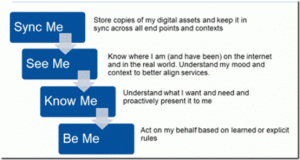
Gartner’s Vision Of The Future Of Mobility; Should Users Be Afraid?
The opening session I attended this morning at the Gartner symposium was entitled “by 2017 your smartphone will be smarter than you”. The speakers were Martin Reynolds and Carolina Milanesi from Gartner and the moderator was Charles Arthur from the Guardian. As a matter-of-fact, the discussion ended up being far more interesting than the title suggested. The panel started to review the future of Smartphones and wearable devices and connected it very well to the issues of data privacy and user benefit, which are central to the use of big data.
Carolina Milanesi introduced the subject by saying that “smartness is achieved through sensors and also geolocation. Yet, “we are not there yet” according to her, and mostly if “people don’t want to share their location information, smartness may not even happen”. I think she exposed the issue very well by emphasising the fact that innovation related to Smartphones will not just be a matter of technology, but of user acceptance and benefits.
There are, according to those 2 Gartner analysts, 4 phases of what they call “cognizant computing”. “We have caught glimpses of each of these phases at the moment depending on the vendors and the services, but we are nowhere near complete smartness” Milanesi added. She and Reynolds went on describing these four phases:

Gartner’s four phases of “cognizant computing”
- “sync me”: this is the most obvious phase, the one which most of the Computing giants have achieved; it is composed of storage and the syncing of personal data,
- the “see me” phase: this is all about our digital footprint. “This phase is still not very intelligent, and not many companies are taking advantage of this” the Gartner analysts said,
- the “know me” phase: this is about understanding who the user is, what he likes and what he does through the data he stored; so that he can be presented with offers and messages which are relevant to him,
- “be me” phase: this is where services are acting on the user’s behalf based on learned or explicit data.